Schuylkill County Commissioner Boots Hetherington loves to say he’s not a micro-manager. In some instances, in any job, that can be a good thing.
However, when Hetherington got adamant more than 2 years ago that 2 of the women suing him in federal court needed to be fired from the jobs they’ve held for years, that lack of micromanagement isn’t necessarily a strong suit. In fact, it’s proven so far to be a major fault.
When you make the fuss he’s made since demanding that Jane Doe 3 and Jane Doe 4 be fired for allegedly misusing the LexisNexis program to somehow expose the private information of more than 9,000 people, you’d think he did his homework on the accusations.
You would think before he agreed to spend stacks and bands of your money to give those 9,000-plus people credit monitoring services as a potential safeguard, he’d have his own reasons for doing so, right?
If you’re going to put on the show he put on in demanding these women be fired – and quite publicly, mind you – you would have thought he’d bring receipts, as they say.
But when you look at the deposition he gave on March 31 of this year, you’ll learn that not only did he not really do his homework on this before demanding these two plaintiffs be terminated, but he barely even knows what they allegedly did wrong or anything about the thing they’re accused of misusing.
And even after Hetherington agreed that the County should hire what it calls an independent firm to investigate the matter further (at YOUR expense, of course), you would have thought he’d not insult your tax money and at least look at the investigation report, right?
Well, apparently, that’s not the way Boots operates.
Instead, the whole reason Boots wanted these women fired, from paraphrasing his own words, is that he heard it from a friend who heard it from a friend that Jane Doe 3 and Jane Doe 4 were in the wrong.
All Boots’ so-called friends at the Courthouse wanted these two employees fired, so Boots does what any wannabe friend would do …
Someone Told Boots He Should Fire Jane Doe 3 and Jane Doe 4, So He Went Along With It … But Didn’t Do His Own Homework

It’s all spelled out very clearly during lengthy exchanges about this subject, in particular, during his deposition testimony earlier this year.
The root of this whole issue is that these Jane Does are accused of “misusing” LexisNexis and potentially exposing the private information of more than 9,000 people.
However, it’s pretty clear from this testimony, Boots doesn’t even know what LexisNexis is or how it works.
Here’s questioning from the plaintiffs’ attorney, Catherine Smith, followed by Hetherington’s answers:
Smith: Jane Doe 3 and Jane Doe 4 have been accused of misusing LexisNexis; correct?
Hetherington: Are you talking about the search engine?
Smith: Do you know what LexisNexis is?
Hetherington: It’s the search engine used by the Tax Claim and Tax Assessment Office.
Smith: What do you mean by search engine?
Hetherington: To look up addresses, yes.
Smith: Have you ever utilized LexisNexis?
Hetherington: I don’t have a password. I have never done it, myself.
Smith: So you haven’t ever been on the system?
Hetherington: No.
Smith: So Jane Doe 3 and Jane Doe 4 have been accused of misusing that system; correct?
Hetherington: That’s correct.
“I don’t know” is a common theme throughout
In this line of questioning, Hetherington reveals how the whole “investigation” into the two Jane Does’ activity started. Now, this is the initial, internal investigation, which Boots first attempted to use to publicly fire the employees.
Smith: When did you first learn of the accusations against them?
Hetherington: From — I first learned from HR Director Heidi Zula.
Smith: Okay. Do you remember when?
Hetherington: Oh, it’s got to be almost a year and-a-half ago. Something like that.
Smith: Was it after the offices were restructured or before?
Hetherington: I can’t be certain.
Smith: Okay.
Hetherington: No, it was after. Yes, it was after. Yes, it was after. After the restructuring took place.
Smith: It was?
Hetherington: Yes, it was after the restructuring took place, correct.
Smith: Okay. And when Ms. Zula told you about this, what, if anything, did you do or say?
Hetherington: She said that someone at LexisNexis contacted her — actually contacted Deb Dasch in Tax Claim that an unauthorized device was tried to use to go into their program.
Smith: Okay.
Hetherington: And that was a red flag to the company.
Smith: Okay. And what happened next?
Hetherington: Next, Ms. Zula started an investigation as to why — what this device was, where it came from, who was operating, who was trying to break into it. We were afraid someone was trying to crash the system and cause damage.
Smith: And did you determine whose device accessed it?
Hetherington: It was Jane Doe 3’s personal computer.
Smith: Okay. What happened next?
Hetherington: Well, then the — let me put this right in my head here. I’ve got to think for a minute. Give me a second. So because that happened, Ms. Zula wanted to go back and look at the system and see if anything else was abnormal or out of, out of place.
Smith: Do you know if anyone called Jane Doe 3 and asked her if she accessed the system?
Hetherington: I don’t know.
Smith: Did you ever ask anyone to call her?
Hetherington: No.
Smith: Did you ever call her?
Hetherington: No, that’s not my — I’m not going to — that’s an investigation. I’m not going to get in the middle of an investigation. That, that is not proper, ma’am. I’m sorry.
Smith: Well, there wasn’t an investigation when Ms. Zula came to you at that time; correct?
Hetherington: She wasn’t — she was, she was working with the company trying to figure out — we had — we thought we had a security breach.
Smith: Right. And then the County found out that Jane Doe 3 had accessed it from her personal computer; correct?
Hetherington: Correct.
Smith: Jane Doe 3 had log-in credentials; correct?
Hetherington: Not on that device.
Smith: But she had log-in credentials?
Hetherington: She had log-in credentials, but she misused the device.
Smith: Did anyone call her and ask her were you the one who used your device to log in?
Hetherington: I don’t know.
Smith: Okay. You didn’t?
Hetherington: No. I’m not going to call.
Smith: Okay. When Ms. Zula conducted this investigation, do you know, did she have any training or experience in Tax Claim Bureau procedures?
Hetherington: I don’t know.
Smith: Do you know if Defendant Zula had ever been trained on the County systems that the Tax Claim Bureau uses?
Hetherington: No.
Smith: Do — no, you don’t know, or no, she does not?
Hetherington: I don’t know.
Boots answering “I don’t know” is a common theme throughout this testimony. And that continued as Smith’s questions tried to dig into what he actually knew.
Smith: Okay. What system does the County — what County system does the Tax Claim Bureau use?
Hetherington: Well, I knew LexisNexis, but I’m not familiar with all of our systems. Okay?
Smith: So other than LexisNexis, are you aware of any?
Hetherington: No.
Smith: Okay. Do you know when Defendant Zula conducted their investigation what training or experience — training, experience or knowledge she had of the real estate tax sale law?
Hetherington: I’m, I’m sorry.
Smith: When Ms. Zula conducted the investigation, do you know what training, experience or knowledge she had related to the real estate tax sale law?
Hetherington: No.
Smith: Do you know who Russ Motsko is?
Hetherington: I’m sorry?
Smith: Do you know who Russ Motsko is? M-u-t- — M-o-t —
Hetherington: He works, he works in the courthouse. Yes.
Smith: M-o-t-s-k-o.
Hetherington: Sorry.
Smith: Do you know what his position is?
Hetherington: I know he works in Tax Assessment. I’m not sure.
Smith: Do you know if he is responsible to pay all bills that come into the Tax Claim office?
Hetherington: I don’t know.
Smith: Are you aware that he contacted Jane Doe 3 to ask her for the bill for LexisNexis so he could pay it?
Hetherington: No.
Smith: Have you aware that Jane Doe 3 has informed the County that the reason she logged in from her computer at home was to obtain the bills, provide them to Mr. Motsko so the County could timely pay that bill?
Hetherington: She was on FMLA leave; correct?
Smith: Well, she was, but are you aware she has informed the County that she did, while on FMLA —
Hetherington: No, I did not know that.
Smith: Okay. Other offices within the County use the LexisNexis system; correct?
Hetherington: I believe in the courts’ side, they — it was one of the Juvenile Probation and Adult Probation, I believe, for addresses.
Smith: Sir, any in the courthouse? Like not in the courts, in the courthouse.
Hetherington: I believe it’s only the Tax Office uses it for addresses only.
Smith: Does the law library utilize LexisNexis?
Hetherington: I don’t know.
Smith: Were reviews of the searches conducted by any other courthouse departments that relied on — let me strike that. Ms. Zula, in her investigation, along with LexisNexis, received a report of searches conducted by the Tax Claim Bureau; correct?
Hetherington: I believe that is correct.
Smith: Were similar reports requested or provided — requested by the County or provided by LexisNexis for the other departments to check their searches?
Hetherington: I don’t know.
Smith: Can you tell me in your own words how you believe Jane Doe 3 and Jane Doe 4 misused the system?
Hetherington: It’s my understanding — and once again, I’m an engineer, not an IT person — but they looked — were supposed to be using this system to look up addresses as a last resort, okay? When we can’t find lienholders, people with absentee owners in order to get this, the judicial sale, tax sale work done. But the — if you look at the contract, it’s very specific that the — there is supposed to be one person has the password, not to share it, and it’s only to be used for addresses. And sitting down, Ms. Zula, I spent a whole day with Ms. Zula investigating that one because to my mind, it was pretty, pretty involved and pretty, pretty significant. And they looked up Social Security numbers, they looked up driver’s license numbers, they looked up criminal background checks, and did neighbors relatives in searches. In some cases, one search started out to be 30 or 40 people. And 9,140 people had their identities improperly looked at as a result. All 48 states — Let me finish. All 48 states, Puerto Rico and Washington, D.C. I’ve got a problem with that, so
Smith: What is wrong with that?
Hetherington: I don’t want my personal information looked at by anybody else besides me and my wife.
Smith: Well, do you know if RETSL requires Jane Doe 3 and Jane Doe 4 to search neighbors and others to discharge the County’s duties under RETSL?
Hetherington: Not 9,000 people. Sorry.
Smith: Do you know how many return mail letters the Tax Claim Bureau receives each year?
Hetherington: Quite a few.
Smith: How many?
Hetherington: I don’t know offhand, but quite a few.
Smith: Okay. Give me a rough estimate.
Hetherington: I don’t know.
Smith: I’m asking for a rough estimate.
Hetherington: I don’t know.
Smith: Over a hundred?
Hetherington: I don’t know.
Smith: Do you know — so how can you say — if you don’t know how many return mail envelopes the Tax Claim Bureau receives, how can you tell me that 9,000 isn’t correct? How can you tell me that 9,000 is an improper amount of searches?
Hetherington: These aren’t return addresses. These are illegal searches.
Smith: Why were they illegal?
Hetherington: Because they would — in the — on the — Ms. Zula showed me on the program, you ask for an address, then you request a Social Security number. It says there, “Are you authorized by the County or by law enforcement to have this information? They had — they had to push yes. Then you ask about a driver’s license. You had to push yes. You have to put — you had to push the button to say I want a criminal background check. So they violated a County policy and violated a vendor contract.
What’s interesting is that when it suits his story, based on the testimony above, Boots claims he can’t get in the way of an investigation. However, in nearly the same breath, he claims to have spent “a whole day … investigating” this matter.
The questioning continued from Smith. And again, you’ll see that one area where Hetherington seems to excel is repeating lines he’s been told. When it comes to doing his own homework, that’s another issue:
Smith: What County policy did they violate?
Hetherington: Pardon? They’re misusing a vendor contract.
Smith: So you believe the vendor contract says that their password is not to be shared?
Hetherington: Pardon?
Smith: Do you believe that the vendor contract says that the password is not to be shared?
Hetherington: It is my understanding, it is.
Smith: You’ve reviewed that contract?
Hetherington: I have not.
Smith: So as you sit here today, part of the reason you believe Jane Doe 3 and Jane Doe 4 misused LexisNexis is because they violated the vendor contract, which you have not even reviewed?
Hetherington: The only two people allowed to have that password are Mr. Roth and Ms. Jane Doe 3. She gave it to at least Jane Doe 4.
Smith: Why do you believe that?
Hetherington: Because admitted she — with Mrs. —
Smith: No, no. I’m sorry. Why —
Hetherington: Jane Doe 4 admitted that she used that password, and that she should not have used it. Okay?
Smith: Why do you believe that Mr. Roth and Jane Doe 3 are the only ones who are supposed to have that contract? I mean that password.
Hetherington: Because that is what the — that’s what the agreement was with LexisNexis.
Smith: Have you reviewed that agreement?
Hetherington: No.
Smith: So do you know that’s what it says?
Hetherington: I’m being told by my Solicitor that is what the agreement says.
Smith: Okay. Are you aware that Mr. Roth was — knew well before the searches, well before the LexisNexis investigation that Jane Doe 4 utilized Jane Doe 3’s log-in?
Hetherington: Do not know that.
Smith: So — I’m sorry. What County policy is it you believe Jane Doe 3 and Jane Doe 4 violated?
Hetherington: The use of the LexisNexis was to look up addresses only for Tax Claim information, not to look up relatives, neighbors, friends, family.
Smith: I’m asking you what policy. Can you give me the County — you said that they violated the County policy. What policy would that be?
Hetherington: They’re only — they’re supposed to use the LexisNexis program to look up addresses for Tax Claim only.
Smith: What County policy says that?
Hetherington: I can’t give you a number. I’m sorry.
Later in the testimony, we learned that not only did Hetherington want Jane Doe 3 and Jane Doe 4 fired, but he also wanted to see if they should be brought up on criminal charges. To the best of our knowledge, they have not.
Again, what’s interesting is that Boots wanted to put on this very public display chastising these particular employees, but his knowledge of the situation was extremely limited, mostly to hearsay.
Remember, during each of the attempted public firings, Boots got very demonstrative with his beliefs that they should be fired for what someone else told him they’d done.
Smith: You referred Jane Doe 3 and Jane Doe 4 to the District Attorney’s office; correct?
Hetherington: Correct.
Smith: What criminal act did you believe they committed?
Hetherington: They — once again, they violated the County policy, and they violated a vendor contract.
Smith: That’s not a crime to violate County policy, is it?
Hetherington: Pardon?
Smith: It’s not a crime — to violate County policy; correct?
Hetherington: I’m not —
Smith: Pardon?
Smith: Is it a crime to violate a County policy?
Hetherington: No.
Smith: Is it a crime to violate a vendor contract?
Hetherington: No.
Smith: What crime, what criminal activity, in violation of the Pennsylvania Criminal Statute which the District Attorney is tasked with investigating and enforcing, did you believe that Jane Doe 3 and Jane Doe 4 violated?
Hetherington: They looked up in property, 9,146 people’s background information, which I believe is not proper.
Smith: What crime?
Hetherington: Pardon?
Smith: What crime?
Hetherington: They violated their personal — personal information.
Smith: What crime? Murder is a crime. Rape is a crime. Harassment is a crime. Can you tell me, do you know a specific crime that you believe they violated?
Hetherington: Once again, they looked up in property, 9,000 —
Smith: Wait, despite not knowing it’s a specific crime, you referred her to the District Attorney’s office for criminal investigation?
Hetherington: Yes.
Smith: Okay. I’m going to show you 322. Do you recognize it?
Hetherington: Let me read it, please. (Reviewing document.) Okay.
Smith: You authored this letter; correct?
Hetherington: Yes, ma’am.
Smith: Did you author a similar letter referring Defendant Halcovage to the district attorney?
Hetherington: I don’t understand the question.
Smith: This is referring Jane Doe 3 and Jane Doe 4 to the District Attorney’s office for criminal investigation; correct?
Hetherington: Correct.
Again, that’s an instance of Hetherington inserting himself in an investigation when he’s already said that he’s not doing that.
Smith: When you reviewed the report which we looked at earlier of Ms. Twigg, concerning Defendant Halcovage’s conduct as it relates to Jane Doe 1, did you write a similar letter referring him to the District Attorney’s office for criminal investigation?
Hetherington: That was, that was given to the District Attorneys for Mr. Bender.
Smith: Did — I’m asking, did you write a similar letter?
Hetherington: No, I didn’t write a letter. No.
Smith: Do you understand, based on Ms. Twigg’s investigation of Jane Doe 1’s claims, that the sexual relationship between her and Defendant Halcovage was not consensual?
Hetherington: No.
Smith: You testified just a moment ago that your understanding of the contract between the County and LexisNexis is that only Jane Doe 3 and Mr. Roth are to access the system. Was that what you testified to? Am I correct?
Hetherington: In addition to the two people in the courts that are allowed to use it.
Smith: Okay. The one — I want to focus on Roth and Jane Doe 3. Were they — do they share a log-in?
Hetherington: I don’t know.
Smith: Do you —
Hetherington: My understanding was they each have a separate log-in.
Smith: Okay. Are they two separate contracts?
Hetherington: I don’t know.
Smith: Okay. Do you know if Jane Doe 3 was even ever shown that contract?
Hetherington: She signed it.
Smith: You believe Jane Doe 3 signed that contract?
Hetherington: I saw where she signed the confidential contract, yes.
Smith: The LexisNexis contract?
Hetherington: The purchase agreement. She signed the purchase agreement. Yes, I saw her signature on that.
Smith: Do you have a copy of that?
Hetherington: No, that was shown to her by the, the Controller’s office, so …
Smith: So you believe that there is some sort of agreement with the County and LexisNexis which Jane Doe 3 signed?
Hetherington: I-I saw a document someplace, whether it was a purchase agreement or — it was the Controller showed me a document that Jane Doe 3 signed.
The Suspension
Can you believe it’s been since September 2021 that these two employees have been suspended from their job? From the upcoming testimony, we’re about to learn that there’s apparently no limit on how long a County government employee can be suspended from their job.
And again, we’re about to learn that Boots simply relies on what people tell him to do rather than take charge of a particularly difficult situation at the Courthouse.
Smith: Who suggested that Jane Doe 3 and Jane Doe 4 be suspended?
Hetherington: Pardon?
Smith: Whose suggestion was that Jane Doe 3 and Mr. be suspended?
Hetherington: Mr. Bender’s.
Smith: When?
Hetherington: I don’t have the date in my head.
Smith: Where were you when he suggested it to you?
Hetherington: Mr. — Mr. Bender’s office.
Smith: Was it just you and he?
Hetherington: I don’t know. I don’t remember.
Smith: Were there discussions about their suspension at an executive session?
Hetherington: I don’t remember.
Smith: You testified that LexisNexis was a system which should be utilized as a last resort to search individuals. Do you remember just testifying to that?
Hetherington: Yes.
Smith: What are the other resorts before the last resort of LexisNexis that are to be utilized?
Hetherington: Well, some of the people on those improper searches worked in the courthouse. If you wanted their address, you could have walked across the street and asked them. It was just across the hall.
Smith: Do you believe that that is a proper means of discharging the duties of the Tax Claim Bureau pursuant to RETSL?
Hetherington: What was your question?
Smith: Do you believe that walking across the hall to speak with someone about their address is proper under RETSL?
Hetherington: What is RETSL?
Smith: You don’t know what RETSL is?
Hetherington: No.
Smith: You don’t know what Real Estate Tax Sale Law is?
Hetherington: No. I’m an engineer, sorry.
Smith: Do you know if those searches were actually authorized under the Real Estate Tax Sale Law?
Hetherington: I don’t understand the question.
Smith: Do you understand the Tax Claim Bureau has certain duties and responsibilities which it has to discharge —
Hetherington: Yes.
Smith: — pursuant to the Real Estate Tax Sale Law?
Hetherington: Yes, ma’am.
Smith: Okay. What are they?
Hetherington: They have to try to find owners of vacant properties. They have to do judicial sales. They have to, you know, get the upset sales. The bottom line is, you know, any time a person lets their property go delinquent more than three years, they have to go to the Sheriff and go through the process or either getting the owner to pay the taxes or else forfeit the property.
Smith: And just a simple search of the person, would you agree, might not yield success of getting a delinquent tax owner to pay taxes; correct?
Hetherington: I don’t understand what —
From that bit of testimony, it’s pretty obvious Hetherington isn’t even sure if the employees he wanted to fire did anything wrong, per their job duties. But since someone influential to him told him to do it, he worked as hard as he could to make sure his influencer got what they wanted.
The testimony continued …
Smith: Just sending, for instance, sending a letter to the address of the delinquent property might not yield a result of having the taxes paid. Would you agree?
Hetherington: No. The example I’m using is if Marie Jones is across the street and she is Treasurer, and I decide to look her up on LexisNexis and look at her criminal background check and into her personal property and do her Social Security and driver’s license, instead of asking Marie what is her address. That took place on several cases. With people who work in the courthouse, these ladies looked up their personal information instead of asking their address.
Smith: You believed that Jane Doe 3 and Jane Doe 4 looked up courthouse employees, what is it?
Hetherington: She did it to Linda Yeich. Linda Marchalk.
Smith: What information did they look up?
Hetherington: She looked up all of her background, okay?
Smith: Who did?
Hetherington: It was Linda Szczerba at the time she had a real estate company.
Smith: Who looked her up?
Hetherington: and — one of the two.
Smith: Which one?
Hetherington: I don’t know.
Smith: Okay. Okay. What did they look up about this woman?
Hetherington: Pardon.
Smith: What information did they look up about this woman?
Hetherington: Her personal background information.
Smith: What personal background?
Hetherington: They did the same thing with Kathleen Gillespie who worked in her office.
Smith: What personal information?
Hetherington: Pardon?
Smith: You said personal.
Hetherington: Their Social Security number, the driver’s license and their backgrounds, okay? These are courthouse employees that are right down the hall.
Smith: Do you know if any of them were connected with someone who owned delinquent — property with delinquent taxes?
Hetherington: Not in the case of Ms. Gillespie, no.
Smith: Do you know if Ms. Gillespie’s name might have come up in connection with a bankruptcy?
Hetherington: No.
Smith: Do you know if Ms. Gillespie’s name might have come up as a lienholder in a property?
Hetherington: No.
Smith: Do you know if Ms. Gillespie might have been looked up because she had a property interest in a property?
Hetherington: She was doing none of those things.
Smith: How do you know that?
Hetherington: Because I asked her.
Smith: Did you go and look at records for the County to determine if that was the truth?
Hetherington: No.
Smith: Did you ask Jane Doe 3 or Jane Doe 4 yourself, why did you look up this woman?
Hetherington: They were asked — that’s not my, my job because that was part of their investigation. That was done by the HR Director and the Solicitor.
Smith: Do you know what explanation they gave? Do you know what explanation they gave?
Hetherington: No.
Smith: Do you know if their explanation — well, we don’t even know what their explanation was. Did you review any —
Hetherington: Well, do you want to know? All right. Maria, I’m sorry, but Ms. Gillespie worked with them in their office, and when questioned by Ms. Zula, they said they were trying to teach her how to use LexisNexis to be a helper.
Smith: That is Ms. Gillespie?
Hetherington: Right.
Smith: Okay. Did you —
Hetherington: So then when they went back to ask Ms. Gillespie, “they never told me about that.”
Smith: Ms. Gillespie was interviewed?
Hetherington: By Heidi Zula.
Smith: Was there notes taken?
Hetherington: Yes.
Smith: There was an interview statement taken?
Hetherington: Yes. Yes. And they — she said they never asked me about that.
Smith: Did you speak with Ms. Gillespie?
Hetherington: Pardon?
Smith: Did you speak with Ms. Gillespie?
Hetherington: No, I-I spoke with Ms. Zula.
Smith: So your understanding of what Ms. Gillespie said is simply from Ms. — what Ms. Zula —
Hetherington: Ms. Zula has it in her notes, and she’s — it’s the statements that she made, so …
Smith: I need to understand your understanding, Mr. Hetherington. Is your understanding simply from what Ms. Zula told you or did you actually speak with Ms. Gillespie?
Hetherington: I did not speak with Ms. Gillespie about the incident.
Smith: So your knowledge of what she said is simply from Ms. Zula telling you?
Hetherington: From her investigation, yes.
Smith: Are you aware that Jane Doe 3 and Jane Doe 4 have informed the County that Defendant Roth had them look up a law school friend?
Hetherington: Yes.
Smith: Has he been investigated?
Hetherington: He admitted to it during the — when — he was part of the team that did the investigation. As soon as he saw it, he told Ms. — he told Heidi Zula that this, this is a person I knew.
Smith: Mr. Roth told Mr. Zula that — Mr. Roth told Ms. Zula that he had instructed Jane Doe 3 and Jane Doe 4 to look up a law school friend?
Hetherington: No.
Smith: What did he —
Hetherington: He was in the office one day, and, and he said, you know — he told me the story. He said, “My buddy from law school, I lost track of him. He was in my wedding. Now I see he was disbarred. I wonder what happened to him.” And said, “I’ll find out for you.”
Smith: And did Defendant Roth tell her that that was not an authorized use at that point?
Hetherington: No.
Smith: Did Defendant Roth tell her not to look the person up?
Hetherington: He left it go in conversation. He just didn’t — I guess, don’t think he realized what she was going to do, so …
Smith: Are you aware that Jane Doe 3 and Jane Doe 4 have informed the County that Defendant Halcovage had them — instructed them to look up individuals?
Hetherington: Yes.
Smith: Was that for proper County business?
Hetherington: No.
Smith: Was Mr. — Defendant Halcovage disciplined in any way?
Hetherington: Pardon?
Smith: Was Defendant Halcovage disciplined in any way?
Hetherington: No.
Smith: Was he investigated?
Hetherington: Well, the, the interesting part about, it was his wife, his sister, and I’m not sure why he would have someone look up his own personal family.
Smith: I don’t really know what that has to do with the question I just asked. The question I asked was, was he investigated for having Jane Doe 3 and Jane Doe 4 look up —
Hetherington: No, I —
Boots never misses an opportunity to distract people from his issues by playing a game of Whataboutism with Halcovage’s issues, by the way.
Smith: One more time with the question.
Smith: I can have it read back, but I believe you testified that Defendant Halcovage asked Jane Doe 3 and Jane Doe 4 to look up individuals.
Hetherington: That’s not correct.
Smith: So my question is, I asked you was it for proper County business and you said no.
Hetherington: What, what was for proper County business?
Smith: Defendant Halcovage’s searches, which is why the questions are kind of conflated. So I’m going to ask you: Did you ever speak with Defendant Halcovage about Jane Doe 3 and Jane Doe 4’s claims that he had them look up individuals?
Hetherington: No.
Smith: Do you know if he did?
Hetherington: No.
Smith: Okay.
Smith: Do you know if —
Hetherington: I’m sorry.
Smith: Do you know if Defendant Halcovage was ever investigated for instructing Jane Doe 3 and Jane Doe 4 to look up in — individuals?
Hetherington: One more time.
Smith: Do you know if Jane Doe 3 and Jane Doe 4’s claims that Defendant Halcovage instructed them to look up individuals was ever investigated by the County?
Hetherington: No.
Smith: Mr. Hetherington, did you make a statement to any County employees that Jane Doe 4 and Jane Doe 3 searched their medical and financial records?
Hetherington: No, I don’t believe I did that.
Smith: Were you ever made aware or did you ever hear Defendant Bender make a statement that Jane Doe 3 and Jane Doe 4 searched employees’ medical and financial records?
Hetherington: No.
Smith: Did you ever hear Ms. Yeich tell any County employees that Jane Doe 3 and Jane Doe 4 ran credit checks on them?
Hetherington: Ms. who?
Smith: Ms. Yeich.
Hetherington: Yeich.
Smith: Yeich. Did you ever hear her make a statement that Jane Doe 3 and Jane Doe 4 ran credit collection on individuals?
Hetherington: No.
Smith: Has anyone ever told you that Jane Doe 3 and Jane Doe 4 misused any of the information they obtained through the searches?
Hetherington: No.
Smith: Okay. Do you have any reason to believe that Jane Doe 3 and Jane Doe 4 misused any of the information they obtained?
Hetherington: No.
Smith: Did you make a statement that you were in fear of a cyber breach?
Hetherington: Yes.
Smith: Okay. Do you — who — to whom did you make that statement?
Hetherington: I just said it today. I mean, LexisNexis told us they were concerned about this unauthorized device creeping in.
Smith: Did you make a public statement or —
Hetherington: No, I don’t believe I did.
Smith: Other than today, did you ever make the statement to anyone else?
Hetherington: I don’t believe I did.
Smith: Okay. As you sit here today, based off of the investigation, are you still in fear of a cyber breach?
Hetherington: Not at this point.
Smith: Okay. For your period of time as commissioner for the County of Schuylkill, what is the longest suspension that you are — unpaid suspension that you are aware of, outside of Jane Doe 3 and Jane Doe 4?
Hetherington: I-I don’t — I can’t — one or two days. I’m not sure. I’m not — I don’t know.
Smith: Okay. And do you know how long Jane Doe 3 and Jane Doe 4 have been suspended?
Hetherington: Probably over 500 days.
Smith: Okay. Do you know why? Why are they still on —
Hetherington: Because of the misuse — this document in my hand. This misuse of the LexisNexis program looking up 9,000 peoples’ information.
Smith: Well, when is — how long is their suspension going to be? How long is their suspension going to be?
Hetherington: I don’t know.
Smith: When is action going to be taken on their current —
Hetherington: It’s an ongoing investigation.
Smith: Is there any deadline for that investigation?
Hetherington: It’s an ongoing investigation.
Smith: Is there any deadline for that investigation to be completed?
Hetherington: Not at this time.
Smith: Are you going to take any action to set a deadline for that?
Hetherington: Not at this time.
The “Independent” Investigation
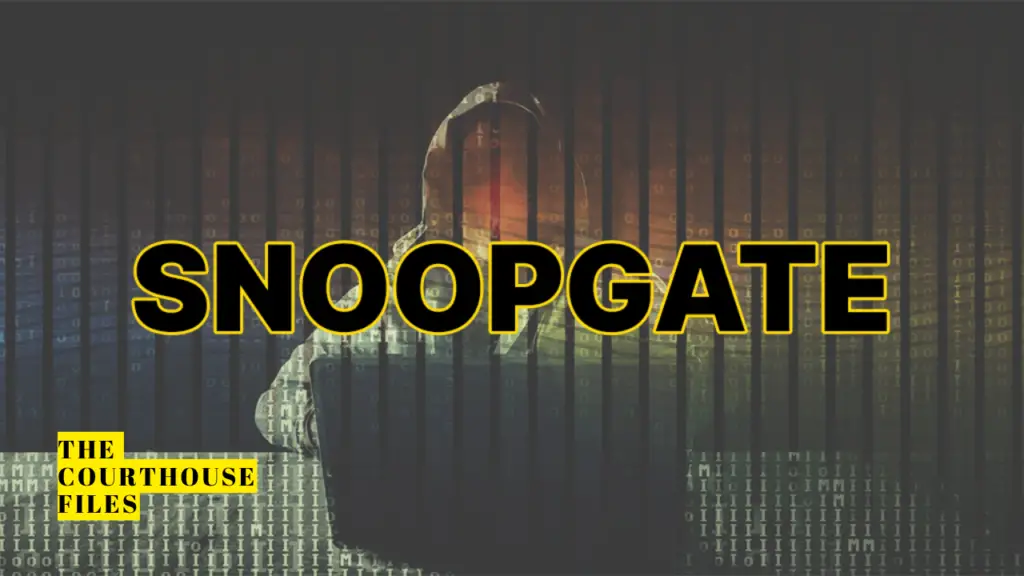
Now, if you’ll remember, the Jane Does in this instance were suspended in September 2021. And in November of that year, Boots made his first attempt at firing them.
Their terminations were placed on the County’s Personnel Action Report (PAR) for the Commissioners meeting on Nov. 4.
At that meeting, however, Boots and his cohorts’ plan to fire them ran into a few problems. He needed just 1 vote besides his own to get the terminations approved. But he didn’t get it.
Halcovage didn’t vote, he said, on the advice of his attorney. And Commissioner Gary Hess said publicly he wasn’t convinced.
This got Boots angry but eventually, the Commissioners agreed to hire the law firm of Eckert, Seamans, Cherin, and Mellott LLC “for the purpose of advising the County pertaining to various data protection statutes and improper use of third-party information search software conducted by County employees.”
Before the vote, Hess added an amendment to it, saying he would agree to hire this firm if they’d also conduct what the Courthouse called an “independent investigation” specifically into the LexisNexis debacle.
It took about 6 months for that “investigation” to be completed, or at least for the Courthouse to talk about it.
Later in his deposition, Hetherington talked about that “independent investigation.” And it probably won’t surprise you to learn that he didn’t even look at it.
Smith: Did your vote on Jane Doe 4 and Jane Doe 3’s termination have — either vote, did you rely on any information provided to you by Eckert Seamans?
Hetherington: No.
Smith: And I’m sorry, other than just — it was whose advice that you relied on?
Hetherington: My two solicitors.
Smith: Roth and Marshall?
Hetherington: Yes.
Smith: Okay. Any other information that you relied on?
Hetherington: No.
Smith: Just their advice?
Hetherington: My solicitors.
Smith: So, again, I’m asking you for either termination. Let’s start with the first one. So you first voted on their termination one time. When you voted at that point, what information did you rely on?
Hetherington: I — did we speak twice or did we table it one time? I thought we tabled it. I don’t think we voted twice.
Smith: Okay. Is that your recollection?
Hetherington: Yeah. We got, we got involved, we tabled it, and there was only one actual vote.
Smith: When was that? The first — what came first, the vote or the tabling?
Hetherington: No, the tabling came first.
Smith: Okay.
Hetherington: Mr. Hess wanted more information, and we tabled it.
Smith: Okay. So you believe you did not vote that first time?
Hetherington: No, I don’t think we did. I mean I — we can check the timeline.
Smith: And you said Mr. Hess wanted more information; correct?
Hetherington: Yes.
Smith: And then there was a second — let me put it this way: Their termination was on the PAR or on the commissioners’ meeting agenda on two separate occasions; correct?
Hetherington: Yes, I believe that is correct.
Smith: Okay. So the first time, it’s your recollection that the vote was tabled, the vote was not taken?
Hetherington: Correct.
Smith: You said Commissioner Hess wanted more information?
Hetherington: Correct.
Smith: The termination was then placed back onto the agenda at a later date?
Hetherington: I believe that is correct.
Smith: And a vote was taken?
Hetherington: Correct.
Smith: And a vote of yes was made by you?
Hetherington: Yes, ma’am.
Smith: And what information did you rely on in making that vote?
Hetherington: The same information I had the first time I put it on the agenda, but it was tabled. Same —
Smith: Which was what?
Hetherington: The 9,146 people who had their backgrounds improperly looked at.
Smith: Where did that information come from?
Hetherington: From the search from LexisNexis.
Smith: So other than the LexisNexis search history, any other — anything else?
Hetherington: No, that’s my …
Smith: Okay. You didn’t go and look at — do any of your own investigation; correct?
Hetherington: No.
Hetherington also admitted that he basically wasn’t open to hearing whether or not the “independent” law firm did anything at all. His mind was made up, as he said, and he knew how he’d vote when their termination was brought up several months later.
Smith: And it’s your testimony that you did not rely on any report of Eckert Seamans when making your vote?
Hetherington: No, I did not.
Smith: Do you recall stating at a meeting, “Ask Mr. Hess. We delayed proper action twice at his request, and we engaged an independent law firm to conduct a review on the matter. Again, Eckert Seamans firm confirmed the investigation was done properly and supported the proposed action of termination. This is an absolute disgrace.”
Hetherington: I made that statement, yes.
Smith: So it’s your testimony that Eckert Seamans did not confirm the investigation was done properly?
Hetherington: What I said was I felt these women should be terminated. I did not base that termination on an Eckert Seamans report. Mr. Hess wanted a second opinion. So I had my mind made up before I — my position, that’s why it was on the agenda, was to have them terminated. He said he wanted to have more information, so Eckert Seamans did a review of what Ms. Zula did, and they recommended they be terminated also. And so that’s why I put it — and Hess, and Hess said he had more. And at that point, he voted no a second time — that time, and they still wanted another investigation. But my position didn’t change.
There’s quite a bit to process in that testimony. But what really stands out is the context of it all.
Remember, Hetherington made a public spectacle of the alleged misuse of the LexisNexis software and how much it meant to him to fire two of the plaintiffs suing him in federal court.
It meant so much that he, by his own admission (when it suited him in this testimony), didn’t do one bit of his own research into the matter. He answered “I don’t know” 17 times in just the excerpts of testimony we pulled on this topic, alone.
Instead, he relied on hearsay information he’d received from other people and processed against the limited knowledge he had of some basic Courthouse functions.
Want to read all the files made available? Check out our Patreon shop …
Subscribe to Coal Region Canary
Get email updates from Coal Region Canary by becoming a subscriber today. Just enter your email address below to get started!Support Coal Region Canary
Like our reporting and want to support truly local news in Schuylkill County? Your small donations help. For as little as $5, your contribution will allow us to cover more news that directly affects you. Consider donating today by hitting the big yellow button below ...




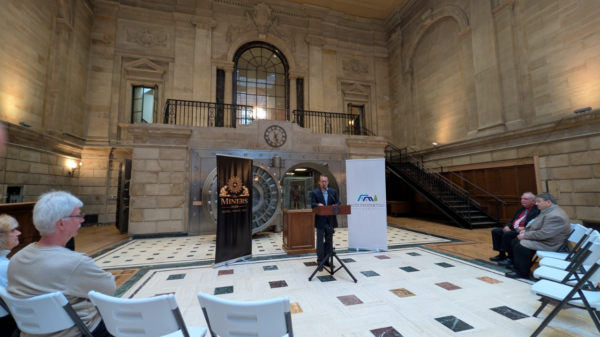













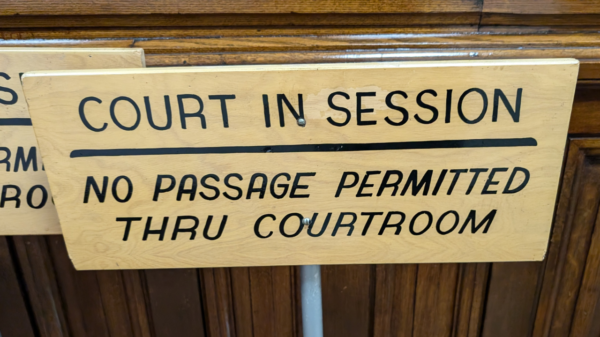









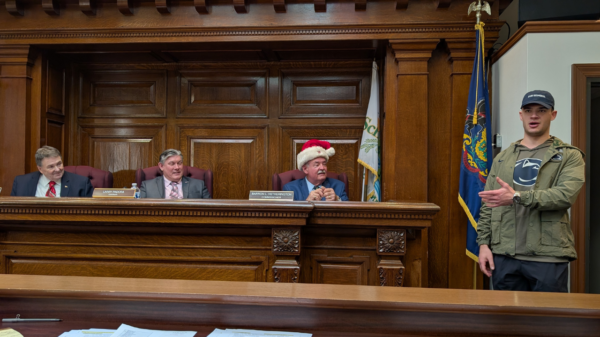



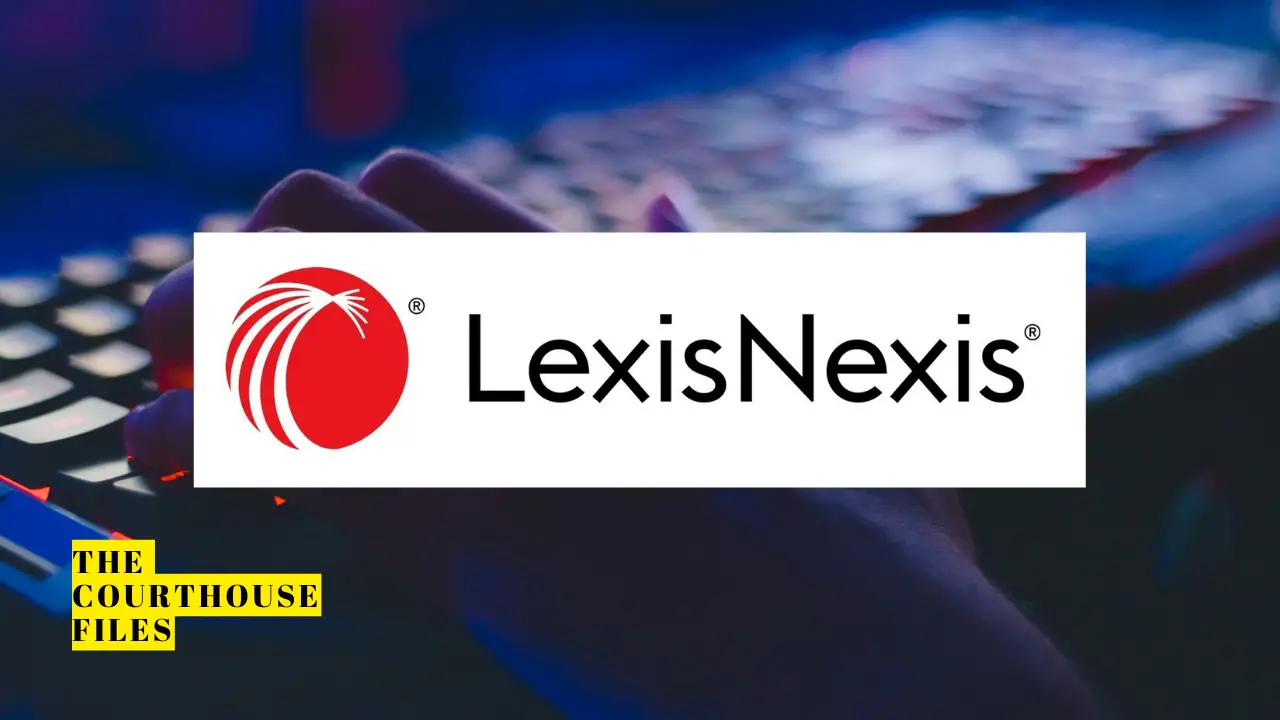
It's me
October 8, 2023 at 10:16 am
Boy, I’m so happy that I’m back on this site!!!!!
Canary Commenter
October 9, 2023 at 12:11 am
We’re glad you’re back, too!
Apparently, a lot of our readers went away because they weren’t getting emails. That was the fault of our (and we’re so happy to say this) PREVIOUS hosting company. Last week, we found a new host and all services we’ve built into the site seem to be magically working again and we barely lifted a finger to make it happen.
Regardless, glad you’re back and hope you stick around for a while. Tell a friend.
Schuylkill County needs a good, reliable news source now more than ever and we hope you and your friends choose Coal Region Canary as the place you go first.
PT Floridian
October 9, 2023 at 8:29 am
After reading through the testimony provided here, the only conclusion one could come to is that Boss Bootsie is an incompetent, low IQ, windbag, that appears to have limited or no knowledge of the responsibilities of his underlings. It’s painfully obvious that this hot air machine is in wayyy over his head and is in damage control mode for himself, by the”deny and deflect” statements he provided.
… His gestapo tactics at meetings is purely a cover for his lack of intelligence and comprehension of County matters as well. What a putz.